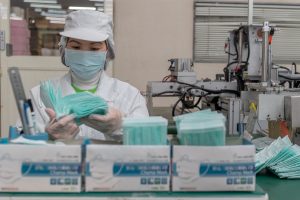Taiwan announced Wednesday it would send 10 million face masks to countries in need amid the COVID-19 pandemic and said it would make future donations as it has ensured its domestic supply after rapidly boosting mask production.
Two million masks will go to the United States, while 8 million will be sent to European countries including Spain, Italy, and France, Taiwan’s foreign ministry said. One million will be sent to Taiwan’s 15 diplomatic allies, mostly countries in Central America, the Caribbean, and the Pacific Islands.
Taiwan has confirmed 349 cases of COVID-19 as of Friday, with five of those being fatal. Most of these cases have been reported over the past two weeks as travelers returned to Taiwan from hard-hit areas of Europe and the United States.
The foreign ministry also said Wednesday a future batch of donations would go to South and Southeast Asian countries – targets of Taiwan’s New Southbound Policy, a signature measure of President Tsai Ing-wen to deepen economic and cultural ties with Asian neighbors and decrease Taiwan’s reliance on China.
Taiwan has been a remarkable success story in combating the coronavirus, due in large part to early screening of passengers from Wuhan, where the outbreak began, and aggressive contact tracing of positive patients.
Upon confirming its first positive COVID-19 case in late January, Taiwan immediately opened new face mask production centers, sending its military to help manufacture masks. The country now produces around 13 million masks per day.
Each Taiwan resident may purchase up to three masks per week, and Taiwan announced on Thursday citizens would be allowed to send masks abroad to other Taiwanese nationals, lifting a personal export restriction that has been intact since January.
Countries around the world face severe mask shortages, and Taiwan had been signaling a desire to begin providing material assistance to nations struggling to equip frontline medical workers.
“Over the past months, we have seen countless acts of bravery and sacrifice from medical workers around the world. It is our duty as global citizens to give them our full support,” Tsai said on Wednesday. “We need to step up cooperation, and that means sharing experiences and materials, and working together to develop treatments and vaccines.”
Taiwan and the United States previously said they would work together on vaccine development and exchanges of medical equipment. Taiwan has since pursued similar arrangements with European countries.
Taiwanese expatriate doctors and foreign nationals of Taiwanese heritage have actively collaborated to work with global hospitals and cities planning coronavirus relief strategies, giving the country of around 24 million a large presence on the global stage.
Taiwan has long called to be included in the World Health Organization (WHO), which does not allow Taiwan to participate or observe at the annual World Health Assembly (WHA) at the behest of Beijing.
The WHO’s exclusion of Taiwan has only become more controversial as the nation has won global plaudits for its handling of the coronavirus outbreak.
Last week, a Radio Television Hong Kong interview with WHO senior adviser Bruce Aylward, conducted via Skype, went viral after RTHK reporter Yvonne Tong asked if the WHO would reconsider Taiwan’s membership. Aylward went silent for several seconds before saying he couldn’t hear the question. When Tong offered to repeat the question, he appeared to hang up the call.
Prominent political figures in the United States, Europe, Japan, and Taiwan’s diplomatic allies have called for Taiwan’s inclusion into the WHO.
But Taiwan seems intent on helping in its own ways as it ensures its own citizens will have enough masks.
Experts have debated the necessity of face masks in recent days. The WHO officially does not recommend wearing a mask if you are not sick, a position that has become controversial.
In Taiwan, along with other Asian countries that have controlled the spread of the virus, almost everyone wears masks, and many believe they can drastically reduce human-to-human transmission, especially as COVID-19 can be transmitted asymptomatically.
Taiwan said on Wednesday passengers could not use public transportation without wearing masks, but it had already been rare to see someone without a mask on a train or bus.
Taiwanese NGOs have also donated masks to other countries after export restrictions were loosened in late March. Two groups said they are donating 10,000 masks each to Philippine hospitals, which face severe shortages of medical supplies as that country’s outbreak worsens.

































